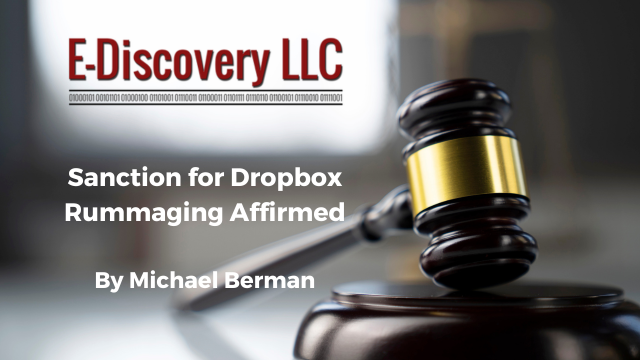
[EDRM Editor’s Note: The opinions and positions are those of Michael Berman.]
In Robins Kaplan Can’t Escape Sanction Over Dropbox Access – Law360 (May 31, 2024), Emily Johnson reported on an appellate decision in the “Dropbox rummaging” sanctions case. A $150,000 sanction against both a law firm and its client was affirmed. Ms. Johnson reported:
The First Department of the New York Appellate Division found Thursday that the trial court’s decision to sanction Robins Kaplan and KrunchCash in October was not an abuse of discretion, rejecting KrunchCash’s argument that the monetary sanction was unwarranted and should be undone, according to the two-page order.
Emily Johnson in Robins Kaplan Can’t Escape Sanction Over Dropbox Access – Law360 (May 31, 2024).
Counsel for Pursuit Credit said: “It’s a good day…. The appellate division affirmed that when lawyers and their clients act unethically, they will pay the costs associated with their conduct.” Id.
Courts generally expect litigants to use the discovery process. Surreptitious “self-help” may lead to sanctions.
Michael Berman.
In oral argument, counsel for Robins Kaplan argued that there should be no sanction because the Dropbox documents were not privileged: “My client has been sanctioned $150,000 for nothing…. There’s no finding that there was privilege.” R. Scharf, Robins Kaplan File Flub Bad Look For Both Sides, Panel Says – Law360 (May 8, 2024).
The order in Pursuit Credit Special Opportunity Fund, L.P. v. KrunchCash, LLC, et al., No. 651070/22 (Sup. Ct. N.Y., App. Div., 1st Dept.), states: “The motion court did not abuse its discretion in sanctioning defendants and their counsel for accessing and downloading folders from a live Dropbox link that, unbeknownst to plaintiff, provided direct access to its corporate files….” [citations omitted].
The court added:
The court here correctly determined that counsel was required to notify plaintiff that it had obtained the Dropbox link inadvertently, as the link contained folders that counsel knew or should have known were confidential or privileged (see id.; see also Rules of Professional Conduct [22 NYCRR 1200.0] rule 4.4[b]). Counsel’s refusal to sequester the inadvertently disclosed files led to plaintiff having to file the underlying motion and incur substantial legal fees.
Pursuit Credit Special Opportunity Fund, L.P. v. KrunchCash, LLC, et al., No. 651070/22 (Sup. Ct. N.Y., App. Div., 1st Dept., May 30, 2024)
The New York court held that the challenge to the amount awarded was both “unpreserved” and insufficient.
For additional background, in addition to the Law360 articles, please see Law360 Report on “Dropbox Rummaging” Case(May 13, 2024), Sanctions Update in Dropbox “Rummaging” Decision (Dec. 1, 2023), and “Self Help” Discovery in Someone Else’s Dropbox is Held to be Sanctionable (Nov. 10, 2023).
On a different, but somewhat parallel issue, please see “Civil Vigilantism” – Sanctions for Surreptitious “Self-Help” Investigation (Mar. 9, 2023). Courts generally expect litigants to use the discovery process. Surreptitious “self-help” may lead to sanctions.


